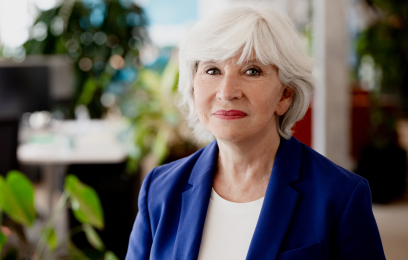McCourt Institute Announces Recipients of 2022 Research Grants to Advance Ethical Technology and Digital Governance
Through McCourt Institute funding, Sciences Po and Georgetown University will award grants to 28 researchers to support 17 projects focused on reimagining ethics, policy and governance for the digital age
PARIS and WASHINGTON – The McCourt Institute, which was established to advance technology for the common good with founding partners Sciences Po in Paris and Georgetown University in Washington, D.C., today announced the 2022 recipients of research grants to advance ethical technology and digital governance. The awardees and their projects were announced during the McCourt Institute’s inaugural event today in Paris.
“The McCourt Institute is thrilled to work with two world-class academic communities to better understand the problems that current technologies have caused and exacerbated and, more importantly, move us closer to the solutions we need,” said Shéhérazade Semsar-de Boisséson, Inaugural Executive Director of the McCourt Institute.
The McCourt Institute has pledged to provide $50 million over 10 years to Sciences Po and Georgetown University to support the development of new scientific work and advance research on technology for the common good. Beginning with the 2022 recipients, funded projects will be selected annually and administered directly by Georgetown University and Sciences Po.
“There is almost no civic challenge–or solution–in which technology does not play a role,” said Maria Cancian, Dean of the McCourt School of Public Policy at Georgetown University. “Georgetown is committed to shaping ethical, equitable, and inclusive technologies that advance the common good. Our collaboration with Sciences Po and the McCourt Institute will help build on strengths in law, computer science, public policy, and ethics to tackle pressing issues at the intersection of technology and civil society.”
“The selected projects address important questions about the impact of digital technologies on the public and private spheres,” said Guillaume Plantin, Dean of Research and Faculty at Sciences Po. “This support from the McCourt Institute will enable Sciences Po’s research teams to reinforce, and even extend, their work on essential topics such as the implementation of fact-checking mechanisms based on empirical evidence in order to fight against disinformation in online political debates, or the development of a robust legal framework adapted to the use of artificial intelligence for commercial or political purposes. Researchers will put these issues into perspective as they consider a more responsible, equitable and democratic digital governance.”
A steering committee representing Georgetown University faculty, Sciences Po faculty, and the McCourt Institute selected 17 projects, to be conducted by 28 researchers from Georgetown’s and Sciences Po’s academic communities. The projects will focus on the impact of technology on individuals and society and explore new governance models, regulatory frameworks and technologies to mitigate harm and advance the common good. Detailed descriptions of each grant project can be found here.
As these research projects are finalized, the McCourt Institute will work with Georgetown University and Sciences Po and the grantees to make their findings available to the public in a variety of formats.
For interview opportunities with the McCourt Institute or any of the researchers, please reach out to Ana Ramic at ana.ramic@mccourt.com.
END
###
ABOUT
The McCourt Institute
Established in 2021 with founding partners Sciences Po in Paris and Georgetown University in Washington, D.C., the McCourt Institute aims to ensure that digital governance is prioritized in the development of new technology and embedded in the next generation of the web. It supports the goals of Project Liberty, a visionary initiative launched by civic entrepreneur, business leader, and impact investor Frank McCourt to transform how the internet works, create a more equitable digital economy, and develop a new civic architecture for the digital world.
MEDIA CONTACT
Ana Ramic, McCourt Institute: ana.ramic@mccourt.com

28.07.2025
JULIE KLEIN EST NOMMÉE DOYENNE DE L'ÉCOLE DE DROIT DE SCIENCES PO
Paris, le 18 juillet 2025 – Luis Vassy, directeur de Sciences Po, a nommé Julie Klein doyenne de l'École de droit. Elle succède à Sébastien Pimont.
Professeure des Universités à Sciences Po depuis 2020, Julie Klein dirige la spécialité « Entreprises, Marchés, Régulations » (EMR) du Master Droit économique. Juriste reconnue, elle est spécialiste du droit des obligations, du droit de la preuve et du droit économique. Elle siège au Conseil scientifique de Sciences Po, préside la section disciplinaire compétente à l'égard des étudiants, et assure la direction scientifique de la Semaine juridique – édition entreprise (JCP E).
Ses travaux interrogent les articulations entre droit civil et droit commercial. Elle contribue activement aux réflexions collectives sur l'évolution du droit, au sein de plusieurs groupes de travail pilotés par la Chancellerie ou le Haut Comité juridique de la place financière de Paris (HCJP), notamment sur la réforme du régime des obligations, le droit des sociétés ou les chambres internationales.
Luis Vassy, directeur de Sciences Po : « Julie Klein est une juriste et chercheuse d'exception investie depuis plusieurs années au sein de l'école de droit et au service de l'institution. À l'heure où les grands bouleversements du monde redessinent les contours du droit, elle portera avec ambition le projet de l'École. Je sais pouvoir compter sur sa vision, son engagement et son exigence intellectuelle pour continuer à porter l'école de droit de sciences po au plus haut niveau.
Je remercie Sébastien Pimont d'avoir assuré la croissance et le développement de l'école depuis cinq ans. Son mandat a été marqué par d'indéniables succès en France avec la réussite massive de nos étudiants dans toutes les professions juridiques, comme à l'étranger, ce dont témoigne l'attractivité croissante de l'école à l'international. »
Julie Klein, doyenne de l'École de droit de Sciences Po : « Je suis très honorée de ma nomination comme doyenne de l'Ecole de droit et remercie Luis Vassy pour sa confiance. L'École de droit de Sciences Po a su affirmer, grâce à mes prédécesseurs, une identité forte et innovante. Je souhaite développer cette dynamique, en consolidant son excellence scientifique, en renforçant les liens avec la pratique du droit, et en accompagnant les étudiants dans leur capacité à penser et exercer le droit dans un monde en transformation. »
Lire plus

